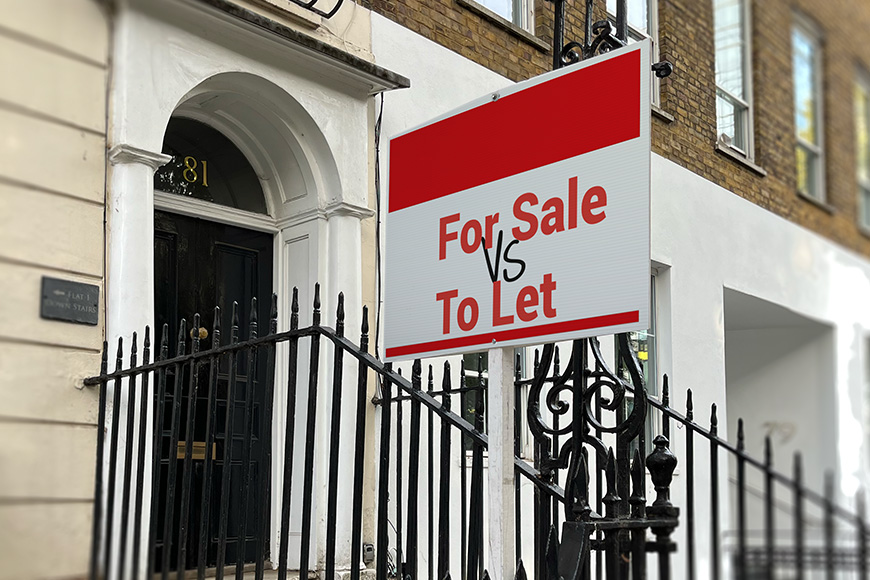On this page
Is it cheaper to rent or own in England? Monthly housing costs data: Renting vs Mortgage Why have mortgage costs increased? Do mortgage rate increases affect renters? Regional rent rises in the England (August 2022 - 2023) Factors affecting property ownership affordability: deposits, stamp duty, and legal fees Buy-to-let (BTL) - is it still worth the investment for landlords? So, what else is there to consider when weighing up renting vs getting a mortgage? ConclusionIs it cheaper to rent or own in England?
For the first time since 2010 in England, renting is now cheaper than owning a mortgaged property… challenging the British assumption that, by default, buying is the better option.

According to our recent data analysis, renting is now the cheaper option in all regions of England, except the North West, when compared to buying a mortgage property.
Finbri's Founder Stephen Clark comments "Successive hikes in the base rate over the past couple of years has led to significantly higher mortgage costs for homeowners, and, whilst renting is now comparatively cheaper than owning a mortgaged property - that's possibly a short-term truth. Our Landlord report published earlier this year showed 52.75% of UK landlords were ready to increase rents to offset any cost increases to them. I wouldn't be surprised to see rents steadily increase over the next two years."
The cost difference between renting and monthly mortgages varies from region to region, but in the South East renters pay £456 less than homeowners in the same region - every month.
Monthly housing costs data: Renting vs Mortgage
| Region | Property Price (average) | Monthly Mortgage Repayments (average) | Monthly Rental Payments (average) | £ Difference (Mortgage vs Rental Payments) | % Difference (Mortgage vs Rental Payments) |
| South East | £394,096 | £1,815 | £1,359 | £456 cheaper to rent | 25.1% cheaper to rent |
| East of England | £352,723 | £1,624 | £1,208 | £416 cheaper to rent | 25.6% cheaper to rent |
| South West | £323,713 | £1,491 | £1,139 | £352 cheaper to rent | 23.6% cheaper to rent |
| East Midlands | £249,484 | £1,149 | £859 | £290 cheaper to rent | 25.2% cheaper to rent |
| London | £534,265 | £2,460 | £2,179 | £281 cheaper to rent | 11.4% cheaper to rent |
| West Midlands | £251,313 | £1,157 | £933 | £224 cheaper to rent | 19.4% cheaper to rent |
| Yorkshire & Humber | £212,730 | £980 | £866 | £114 cheaper to rent | 11.6% cheaper to rent |
| North East | £163,480 | £753 | £668 | £85 cheaper to rent | 11.3% cheaper to rent |
| North West | £215,648 | £993 | £1,006 | £13 cheaper to own | 1.3% cheaper to own |
Source: HomeLet Rental Index September 2023, House Price Index July 2023
Based on: An average regional property price, homeowner repayment mortgage at 75% LTV, with October 2023's average 5.5% interest rate, and a 25-year term.
So what does this show us?
Apart from in the North West, currently it's cheaper to rent than own in England.
Buy-to-let landlords in the North West can currently expect to make £13 a month once their mortgage fees have been deducted from their rental income.
Landlords in other regions aren't so "fortunate".
In the North East, mortgage payments are currently £85 more than the average rental income. Landlords in London face paying £281 more on their mortgage than they'll receive in rent. And landlords in the South East face a whopping minus £456 difference between their mortgage vs rental income.
Why have mortgage costs increased?
Due to the 14 consecutive base rate rises, average mortgage payments have ballooned by 33% in the past year alone, decimating up to an incredible 80% of the property owner's monthly household income.
For property owners with variable-rate mortgages, any rate increase will directly and instantly affect their average monthly repayment amount. For the 1.4 million households whose fixed rate mortgage will or has expired in 2023, the pain of this financial burden is on their doorstep, if it's not already arrived.
Do mortgage rate increases affect renters?
In a word, yes. The 4.6 million private renters in England aren't immune to the effects of mortgage rate hikes, and as a knock-on consequence, they've also been struck by rents rising fast across all regions. It seems rent rises are set to continue by up to 8% in Q4 2023 alone, according to forecasts.
According to property website Zoopla, an estimated 60% of landlords now have mortgaged properties - up from 50% of landlords in 2021. This means that the majority of landlords will be experiencing increased mortgage repayments when any fixed deal ends.
The recent rent rises are likely primarily driven by landlords trying to balance their books and offset the cost of their buy-to-let property financing. This, in turn, raises the average rent for an area, and even those landlords who aren't mortgaged could choose to increase their rents in line with the localised average.
Regional rent rises in the England (August 2022 - 2023)
| Region | Percentage increase in rent (August 2022 - 2023) |
| London | 5.9% |
| West Midlands | 5.8% |
| Yorkshire & Humber | 5.3% |
| South East | 5.3% |
| East Midlands | 5.1% |
| East of England | 5.1% |
| North West | 5.1% |
| North East | 4.8% |
| South West | 4.8% |
Source: Index of Private Housing Rental Prices, UK: August 2023 (ONS)
The longer-term impact of rising mortgage costs on rents
The long-running saga of the housing supply shortage in England means demand is consistently surpassing availability, which inevitably drives up property prices.
The increased borrowing costs, heavier regulation and legislative changes that have been dubbed a 'war on landlords' only exacerbates the housing crisis as 44% of landlords are considering selling their buy-to-let properties - as it takes much-needed rental housing stock out of the market.
Stephen Clark, from Finbri, goes on to say, "We've seen a noticeable drop in bridging loan enquiries from new buy-to-let investors such as private landlords, however this is to be expected in such a challenging environment. As with most commercial ventures the opportunities are cyclical, and as one investor moves out of the market, it leaves a gap, and that gap is often quickly seized by another investor.
As such, these factors are projected to drive rents up even further - with increases up to 25% by 2026, resulting in an average monthly rental increase of £1,550.
Disposable income, and the factors affecting affordability for buyers and renters
Amid the cost of living crisis, homeowners and renters are seeing their disposable income fall. According to the government's March 2023 forecast, there will be a significant 3.7% decrease in household disposable income the UK for 2022/23. This represents the most significant decline in living standards since 1956.
Disposable income affects financial stability by determining how much money renters or mortgaged property owners have left over for savings, emergencies, and discretionary spending after housing costs.
Although wage growth is now outpacing the rate of inflation, renters and buyers are still facing high costs associated with energy, fuel and food.
Cities with the most disposable income each month
| City | Average disposable income per month |
| Colchester | £1,198 |
| Doncaster | £1,068 |
| Milton Keynes | £1,053 |
| Coventry | £990 |
| Aberdeen | £982 |
Sources: Office for National Statistics (ONS), Numbeo
Cities with the least disposable income each month
| City | Average disposable income per month |
| Nottingham | £482 |
| London | £500 |
| Plymouth | £574 |
| Manchester | £580 |
| Leicester | £589 |
Sources: Office for National Statistics (ONS), Numbeo
The typical British adult residing in a UK city has a monthly disposable income of £782 after expenditures. This reflects a decrease of £84 per month compared to the £866 monthly average in 2022.
London has the highest living expenses, averaging £2,196 per month. In 2023, the average disposable income for London residents has decreased by a significant 44% compared to 2022.
However, Hull emerges as the most budget-friendly city, anticipating spending £858.84 on rent and essential items.
Factors affecting property ownership affordability: deposits, stamp duty, and legal fees
The affordability of buying versus renting is not just about monthly mortgage repayments or rent. It's also impacted by upfront costs such as deposits, stamp duty, and legal fees.
Deposit: A larger deposit typically means lower monthly payments, but it requires substantial savings that would-be buyers struggle to obtain due to increasing costs.
Looking at an average property price in the UK of £289,824, a 10% deposit would mean saving up £28,982.
And amid the cost-of-living crisis, the average time to save for a home deposit in England has reached 10 years, where it would've typically taken 6.8 years in 2012 - signalling the growing unaffordability.
Stamp duty, the tax paid on property purchases in England and Northern Ireland, can also add to your initial outlay.
Conveyancing (the legal process of buying a house) is not cheap. It can include search fees, land registry costs, and solicitor's charges - often adding up to over £1,000.
Factors affecting property rental affordability
Deposit: Landlords typically ask for 5/6 weeks rent as a deposit, but as rents continue to rise, this has reached an average of £1,914 (based on the average UK rent of £1,276).
Bills and Utilities: As a tenant, you'd need to pay Council Tax, (rising) gas and electric bills, internet and phone bills, TV licence, and any other bills and utility fees associated with the property.
Tenant Insurance: Renters may need to purchase renter's insurance, adding to their monthly expenses - this costs around £66 a year on average.
Parking: The availability and cost of parking, whether on-site or off-site, is a common cost faced by renters living in urban areas.
When considering renting versus mortgage, it's essential to factor in these upfront and ongoing costs.
Buy-to-let (BTL) - is it still worth the investment for landlords?
| Region | BTL Property Price (average) | BTL Mortgage Repayments (average) | Monthly Rental Income (average | Estimated Rental Gross Yield (%) | Estimated Rental Net Yield (%) |
| London | £522,000 | £2,523 | £2,179 | 6.68% | -1.05% |
| South East | £301,000 | £1,455 | £1,359 | 7.22% | -0.51% |
| East of England | £266,500 | £1,288 | £1,208 | 7.25% | -0.48% |
| South West | £242,500 | £1,172 | £1,139 | 7.52% | -0.22% |
| East Midlands | £178,000 | £860 | £859 | 7.72% | -0.01% |
| West Midlands | £182,500 | £882 | £933 | 8.18% | 0.45% |
| Yorkshire & Humber | £150,000 | £725 | £866 | 9.24% | 1.50% |
| North East | £109,000 | £527 | £668 | 9.81% | 2.07% |
| North West | £151,000 | £730 | £1,006 | 10.66% | 2.92% |
Source: Zoopla Rental Market Report September 2023, HomeLet Rental Index September 2023. Figures based on buy-to-let repayment mortgage at 75% LTV, 6% interest rate, 25-year term, as a private landlord not through an SPV / company.
In two words - possibly not. Despite the growing demand for rental properties, our research has found that now may not be the right time to invest in BTL, especially in certain regions in England where the net rental yield isn't positive.
Of course, there are other considerations such as the potential of capital appreciation of the property over the long term. So it's not as simple as just working out the rental yield that would deem the investment a good or bad idea. However, rental yields are typically the most influential factor.
We calculated that if you were to take out a BTL mortgage (75% LTV, 6% interest rate, interest only 25-year mortgage term), in only four English regions would the monthly rent cover the mortgage repayments and provide any positive return.
With the highest average yield being a paper-thin 2.92%, more lucrative returns can be easily obtained from the simplest of investments such as regular savings accounts at high street banks.
Furthermore, when you factor in the additional costs such as just the basics of building insurance, landlord insurance, general maintenance and repairs - owning an average buy-to-let simply doesn't seem to stack up.
So what about that capital appreciation? Let's take a look at what the 5-year forecasts are looking like.
5 Year UK property price forecast
| Year | UK Property Price Increase (%) |
| 2023 | -7% |
| 2024 | -4% |
| 2025 | +4% |
| 2026 | +4% |
| 2027 | +5% |
Source: Knight Frank
In summary, if you bought an averagely-priced property for £290,000 at the beginning of 2023, the accumulative capital appreciation by 2027 would be 1.4%, increasing that property value by £4,060 to £294,060.
So, what else is there to consider when weighing up renting vs getting a mortgage?
Clearly, the decision between renting or getting a mortgage is a complex one. Let's look at the other considerations when weighing up renting vs getting a mortgage.
Here are some of the main advantages and disadvantages associated with renting:
- Lower upfront costs: Renting typically requires a smaller upfront financial commitment; this is usually no more than 6 weeks rent (for a deposit), and in some cases, renters may be required to pay 1-2 months' rent in advance.
- Maintenance responsibility: When renting, the landlord is responsible for keeping the property up to standard. This includes property structure and exterior, plumbing, electrics and general wear and tear.
- Limited control: Renting typically means limited control over the property - renters may be unable to make significant changes or upgrades without the landlord's permission.
- Rent increases: Landlords can increase rent with one month's notice (a yearly tenancy requires 6 months' notice), which may lead to rising housing costs over time.
- No-fault evictions: Often referred to as Section 21, these proceedings enable landlords to remove tenants from their properties without providing a specific justification - causing a sense of unpredictability and insecurity for tenants.
Here are some of the main advantages and disadvantages associated with owning a property:
- Equity building: With a mortgage, buyers gradually build equity in the property as mortgage payments are made. This could be considered a form of 'forced savings' and a long-term investment.
- Stability: Buyers typically have more stability and control over their living situation. You can make home improvements, decorate, renovate, and the property is yours - you won't have the threat of no-fault evictions.
- Long-term investment: Over the past ten years, the average housing prices in the UK have surged by 53%, climbing from £222,989 to £341,019. Although prices have dipped, by 2025 house prices will resume their upward trend.
- Higher upfront costs: Buying a home typically requires a significant upfront payment, including a down payment, closing costs, and potential maintenance or renovation costs. For first-time buyers costs are estimated at £2,000, but when moving costs could amount to £14,000.
- Responsibility for maintenance: Homeownership entails maintaining your property, which can incur significant expenses - for example, a new boiler could cost up to £4,500.
- Market fluctuations: The property's value can fluctuate with the housing market, and there is no guarantee that it will appreciate in value. Despite a predicted downward trend in property values in 2023 and 2024, values are set to increase from 2025.
Conclusion
No one can accurately predict the property market at the best of times, let alone just after a pandemic, amid raging global inflation, the world order being challenged, a war on the doorstep of Europe, an unprecedented AI threat to not just jobs but the entire taxation system itself, and now with the human catastrophe unfolding in the middle east.
Is it cheaper to rent than own? The answer is that today, on average, it's probably cheaper to rent. However, there is one characteristic of the property market that you can absolutely rely upon - it does and will change. It could be tomorrow, it might be next year, but change will come, and there will be winners and losers a plenty.





